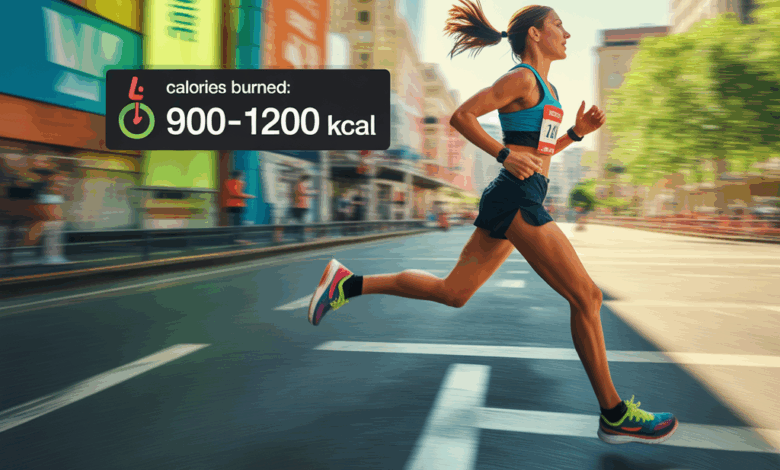How Many Calories Do You Burn in a Half Marathon? Real Numbers, Examples & Tips

Have you ever crossed that finish line after 13.1 miles and wondered, “Exactly how many calories did I torch out there?” Whether you ran for time, fun, or to hit a weight-loss goal, understanding the energy cost of a half marathon can help you plan training, nutrition, and recovery more effectively.
How many calories do you burn in a half marathon — average estimate
Short answer: it varies, but most runners burn between ~1,000 and 1,700 calories during a half marathon (13.1 miles). A handy rule of thumb is roughly 0.63 kcal per pound per mile — so multiply your body weight in pounds by about 8.25 (0.63 × 13.1) to estimate your burn. For example, a 150-lb runner would burn about 1,240 calories (150 × 8.25 ≈ 1,238).
Why calorie burn varies: key factors that change your total
Body weight and composition
Heavier runners expend more energy to move their mass, so a 200-lb runner will burn considerably more calories than a 120-lb runner at the same pace.
Pace and intensity
Faster paces increase energy expenditure. Running at a 7:30/mile pace will cost more calories per mile than jogging an 11:00/mile pace, because higher-intensity running demands more oxygen and recruits more muscle fibers.
Terrain, elevation and conditions
Hills, trail surfaces, heat, wind, and even cold can raise calorie burn. Trail and hilly half marathons often increase total energy expenditure compared with flat, calm road races.
Fitness level and metabolic rate
More efficient runners (often experienced) may burn slightly fewer calories at the same pace because their economy improves. Conversely, a higher basal metabolic rate (BMR) increases overall daily energy needs.
Real-world examples: estimated calories burned by weight and pace
Below are approximate totals for a 13.1-mile run using the 0.63 kcal/lb/mile rule. These are estimates — use them as a practical guide.
- 120 lb runner: 120 × 8.25 ≈ 990 calories
- 140 lb runner: 140 × 8.25 ≈ 1,155 calories
- 155 lb runner: 155 × 8.25 ≈ 1,280 calories
- 170 lb runner: 170 × 8.25 ≈ 1,402 calories
- 190 lb runner: 190 × 8.25 ≈ 1,570 calories
- 210 lb runner: 210 × 8.25 ≈ 1,733 calories
Alternate method (METs): calories = MET × weight (kg) × hours. Typical running METs range from ~8 (easy pace) to 12+ (fast pace). For a 70 kg person running at a MET of 9.8 for ~1.75 hours (10:00/mile), calories ≈ 9.8 × 70 × 1.75 ≈ 1,199 kcal — similar to the rule-of-thumb result.
How to estimate your personal burn (calculator method)
- Step 1: Convert weight to pounds (if needed).
- Step 2: Use 0.63 kcal/lb/mile × 13.1 miles for a quick estimate: Calories ≈ 0.63 × weight(lb) × 13.1.
- Step 3: For more precision, use METs: estimate your pace, pick the corresponding MET, then apply calories = MET × weight(kg) × hours.
Keep in mind these are estimates — wearable devices and race-day stress can influence the numbers.
Training, fueling and recovery: practical tips to support your goals
Pre-race and long run fueling
- Aim for a carb-rich breakfast 2–3 hours before a half marathon (e.g., oatmeal, banana, toast). Avoid heavy fats and fiber close to start time.
- For races over 90 minutes, plan to consume 30–60g of carbohydrates per hour during the run (gels, chews, sports drink).
Training workouts to improve calorie burn and performance
- Long runs: build endurance with progressive long runs up to 10–14 miles.
- Tempo runs: steady efforts at lactate-threshold pace to improve efficiency.
- Interval sessions: 400–1600m repeats to increase VO2 max and speed.
- Hill repeats and trail runs: add strength and stability while increasing energy cost.
Strength, cross-training and recovery
- Include 2 strength sessions per week (squats, lunges, deadlifts, core work) to build power and protect joints.
- Cross-train (bike, swim) to maintain aerobic fitness without constant pounding.
- Post-run: prioritize 20–30g protein within an hour to aid muscle repair, alongside carbs to replenish glycogen.
Workout variations to try this week
- Moderate interval day: 6 × 800m at 5K pace with 2-min recovery.
- Tempo builder: 20–30 min at half-marathon goal pace within a 60-minute run.
- Long run with surges: 10–12 miles with 6 × 1-minute pickups at hard effort.
These sessions boost calorie burn during and after training through elevated metabolic demands.
Frequently Asked Questions
Yes — a half marathon burns significant calories, which can support weight loss when combined with a sensible calorie deficit. However, many runners overcompensate by eating more post-race, so track your intake and prioritize nutrient-dense foods.
Wearables provide helpful trends but can be off by 10–25% depending on the device, heart rate accuracy, and algorithms. Use them as directional guides and cross-check with simple formulas if you need a second opinion.
Running faster increases per-minute calorie burn but shortens total time, so total calories may not rise proportionally. Heavier or less efficient shoes and extra weight (like a vest) do increase calorie burn but can raise injury risk — use caution.
Conclusion: Know your numbers, train smarter, recover better
So, how many calories do you burn in a half marathon? Most runners will burn roughly 1,000–1,700 calories depending on weight, pace, terrain, and fitness. Use the 0.63 kcal per pound per mile rule or MET calculations to personalize the estimate, and pair that knowledge with smart fueling, consistent workouts, and strength training to get the most from every mile.
Ready to plan a training block or dial in race nutrition? Check out our workout routines and nutrition guides, and don’t forget to browse our wellness tips for recovery strategies that keep you strong season after season.
Sign up for training updates or leave a comment below with your race-day numbers — I’d love to help you fine-tune your plan.





